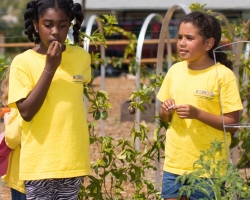
Volunteers and staff at Olivewood Gardens and Learning Center, an urban garden in National City, are educating local schools and families about organic gardening.
“We want to help the community reconnect with its roots,” said Amy Carstensen, executive director of Olivewood Gardens and Learning Center.
National City was once an agricultural city whose main industry was olives, now there are little or no traces of farms let alone olive groves.
Olivewood Gardens and Learning Center is bringing a little of that back. Visitors at Olivewood Gardens have the opportunity to take part in something they may have never done.
“A lot of these kids know little or nothing about gardening when they come here; this is their first time pulling food out of the ground or seeing seeds,” Carstensen said.
The students come from local schools to get hands-on instruction in organic gardening and learn how to prepare healthy recipes. The field trips are scheduled so that students learn each stage of gardening, hopefully returning three to four times a year, Carstensen said.
“I am glad they have this available in their own backyard and they don’t have to go up to La Jolla to have access to fresh food. Everyone deserves to have access to fresh foods,” Carstensen said.
Olivewood Gardens and Learning Center has several gardens, including a “three sisters garden” and an instructional garden where children learn gardening basics such as planting seeds and composting.
The garden is filled with planters. There are colorful tire and hexagon planters where seedlings grow and a pizza garden that has ingredients for pizza.
The vegetables are harvested by the children and taken to the kitchen where volunteer chefs have prepared kid friendly recipes. The chef enlists the children’s help with each step of the recipe, encouraging them to feel, touch and smell each item as they begin to chop, dice and grate.
Carstensen said children seem to enjoy the food, they have a hand in making it and they want to try it.
Getting the children to eat the food they prepare isn’t hard; it’s having access and getting beyond the costs of eating fresh. Carstensen believes that with planning, eating healthy can be more affordable.
“It takes time and investment but if you believe in it you can justify it,” she said.
“Access and active people in the community is the only way to make it work,” said Vilayphone “Vil” Sisouphanthong, a graduate student of National University who recently completed an in depth study of community gardens.
He said when people work to grow and maintain gardens, it has purpose.
“They take pride in ownership, and will continue to take part (in the garden) and that doesn’t happen when food is just handed to them,” Sisouphanthong said.
“We are feeding our children to death in this country, we all know that we need to eat fresh fruits and grilled chicken rather than fried chicken but they (the community) need to be inspired to and that’s what we try to do here,” Carstensen said.
The reception of the garden has been “beyond what we expected and has exceeded expectations,” Carstensen said, acknowledging that this can’t be done alone.
The volunteers and staff work together like the garden to ensure the success of Olivewood Gardens.
“You can’t rely on any one person, you gotta be diversified, not in a financial way … it’s like a garden … it needs all the components for the ecosystem to grow; you need soil, water, love, nurture, bees and butterflies,” Carstensen said.














